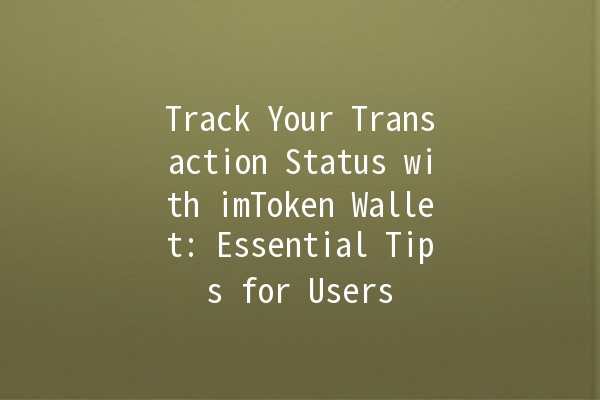In the rapidly evolving world of digital wallets and cryptocurrencies, individuals utilizing platforms such as imToken find themselves navigating a myriad of transactions daily. One frequent task is monitoring the status of transactions. Understanding how to effectively track these operations helps mitigate anxiety and uncertainty in the blockchain environment. Here, we delve into practical suggestions for maximizing your transaction status tracking using imToken.
Transaction status tracking is pivotal for anyone engaging in cryptocurrency transactions. It allows users to confirm whether their transactions have completed successfully, are pending, or have failed. Knowing how to verify this information can lead not only to peace of mind but also to informed decisionmaking regarding future actions, which can encompass retries, cancellations, or further investments.

Before diving into transaction tracking methods on imToken, it’s crucial to grasp the fundamentals of how blockchain transactions operate. When a transaction is initiated, it is transmitted to a network of nodes. These nodes verify the validity and authenticity of the transaction, after which it is added to a block. Once the block is validated, the transaction is marked as confirmed.
Explanation: The imToken wallet includes a dedicated feature that allows users to view their transaction history and monitor the status of each transaction.
Application: To check the status, navigate to the ‘Wallet’ section within the app, then select ‘Transaction History.’ Every transaction will be detailed here, indicating its current status (pending, successful, or failed). This can save time and prevent confusion.
Explanation: Blockchain explorers allow users to track transactions directly on the blockchain.
Application: Once you’ve noted your transaction ID from imToken, input it into a blockchain explorer such as Etherscan for Ethereum transactions. This provides detailed insights into the transaction's progress, including confirmation counts and timestamps.
Explanation: Network congestion can significantly impact transaction times, making it essential to stay informed.
Application: Use websites that provide realtime data on network conditions, such as gasprices.network or ethgasstation.info. This allows you to gauge whether delays in your transaction are due to external network factors, aiding in future transaction fee decisions.
Explanation: Notifications can be set up to inform you of your transaction status without having to check manually.
Application: Within the imToken settings, enable notifications for transaction updates. Some blockchain explorers also offer alert services, so you can receive updates via email or SMS when your transaction's status changes.
Explanation: Sometimes transactions face issues due to various reasons errors in the wallet, network delays, etc.
Application: If a transaction appears stuck for too long, don’t hesitate to reach out to imToken’s customer support. They can provide insights and solutions to help resolve potential issues swiftly.
To find your Transaction ID, go to the transaction history section of your imToken wallet. Each transaction listed will have a unique ID associated with it. You can tap on the relevant transaction to display detailed information, including the TxID.
If your transaction is still pending after a considerable time, first check the gas fee you paid. If it’s too low compared to the current network conditions, it may be beneficial to resubmit the transaction with a higher gas fee. Additionally, analyzing the status on a blockchain explorer can provide further clarity.
Typically, a failed transaction will be marked explicitly in your transaction history with an error message. If you're using a blockchain explorer, look for indications of failure, such as "Reverted" or similar terminologies.
Transaction confirmation times can vary significantly based on network activity. During periods of high demand, confirmations can be delayed as miners prioritize transactions based on respective fees. Ensuring your gas fee aligns with current network standards can help avoid this issue in the future.
Once a transaction is submitted to the blockchain, it typically cannot be canceled. However, if it's still pending, you might be able to submit a new transaction with a higher gas fee, which can sometimes replace the old one. Always monitor the transaction status during this process.
A doublespend occurs when someone tries to spend the same cryptocurrency transaction more than once. This typically happens due to network issues. To avoid this, always ensure transactions are confirmed before initiating another transaction that uses the same funds.
While tracking transaction status is crucial, imToken offers even more tools to facilitate smooth cryptocurrency management. Utilizing its features, such as portfolio tracking and decentralized exchange capabilities, can enhance your overall experience.
Portfolio Management: Monitor and manage multiple cryptocurrencies in a single location.
Decentralized Exchange: Swap tokens without leaving the wallet, promoting security and convenience.
MultiChain Support: Stay ahead in the diverse market by handling multiple blockchain networks within a single app.
With these features, users not only improve their transaction oversight but also their general cryptocurrency experience.
The imToken wallet facilitates a seamless transaction experience, but understanding how to effectively monitor transaction status is essential for users navigating this landscape. By leveraging builtin tools, utilizing external resources, and staying informed about the network conditions, you will enhance your ability to manage transactions efficiently. Embrace these practices to ensure your cryptocurrency activities are as smooth and problemfree as possible, and enjoy the benefits of a welltracked digital wallet experience.